When it comes to caring for a Portuguese Water Dog, understanding its unique needs is essential for fostering a healthy and happy life. Renowned for their robust energy levels, intelligence, and affectionate nature, Portuguese Water Dogs are a breed that thrives on engagement and activity.
Typically medium-sized, with males standing at 20 to 23 inches at the shoulder and females slightly smaller, their muscular build supports a lively lifestyle.
However, like any breed, they have their specific health concerns, including hip dysplasia, eye diseases, and certain heart conditions, which can be mitigated or managed with a proper diet.
The cornerstone of keeping your Portuguese Water Dog in peak condition is a balanced diet tailored to their particular needs.
This blog post aims to provide you with the most current, well-researched, and practical advice on feeding your furry companion.
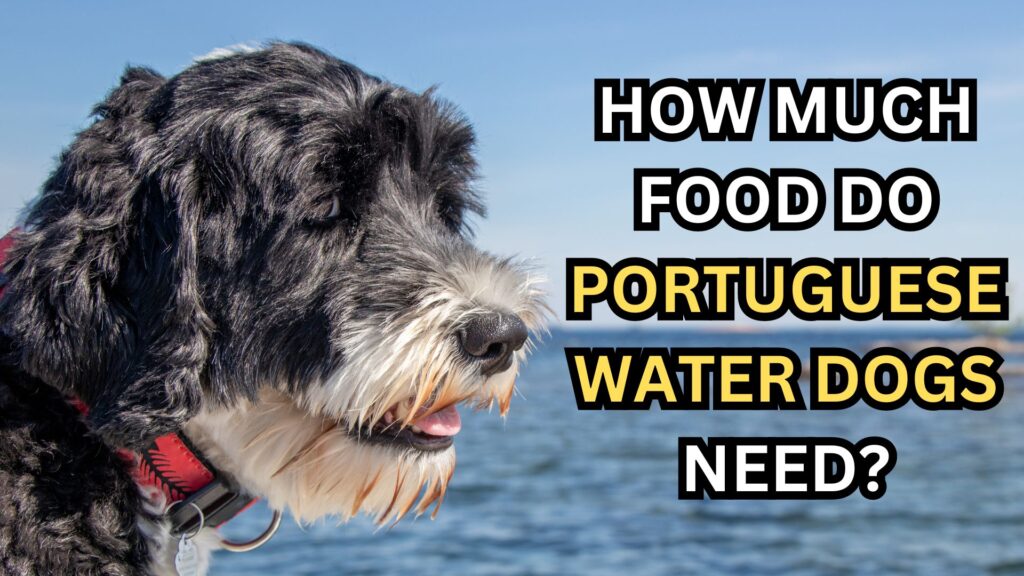
Understanding Your Portuguese Water Dog’s Dietary Needs
The dietary needs of a Portuguese Water Dog vary significantly over their lifespan, influenced by age, weight, activity level, and specific health conditions.
Puppies, for instance, require more calories and nutrients per pound of body weight to support their rapid growth, while adult dogs need a well-balanced diet that maintains their health and energy levels without promoting obesity.
Senior dogs may need adjustments in their diet to accommodate slower metabolisms and potential health issues.
High-quality dog food is paramount, regardless of age. Look for products that list real meat, vegetables, and whole grains among the first ingredients. These components ensure your dog is getting the essential proteins, carbohydrates, vitamins, and minerals needed for a balanced diet.
How Much Food Should Your Portuguese Water Dog Eat?
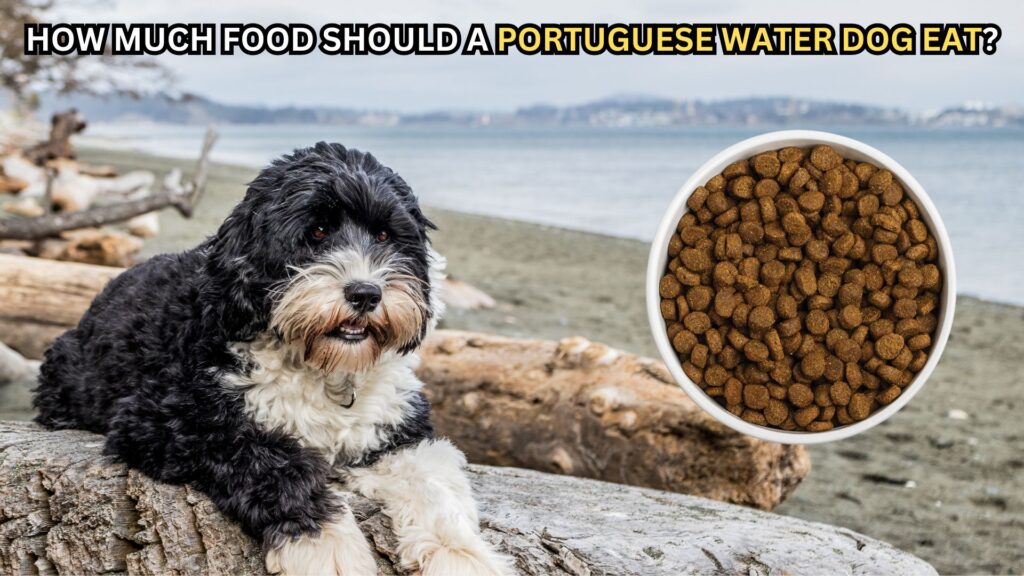
General guidelines for feeding a Portuguese Water Dog suggest that puppies should be fed more frequently with smaller portions, typically three to four times a day.
As they transition to adulthood, the frequency can decrease to twice daily. The portion size will vary depending on the dog’s size and activity level, but a starting point for adults is about 2 to 2.5 cups of high-quality dry food per day, divided into two meals.
It’s crucial to adjust food quantity based on your dog’s activity level and metabolism. An active dog that regularly participates in physical activities may require more food than a more sedentary pet.
Regular check-ups with your vet can help you determine if your feeding routine needs adjustments to keep your dog at an ideal weight.
Types of Food: Pros and Cons
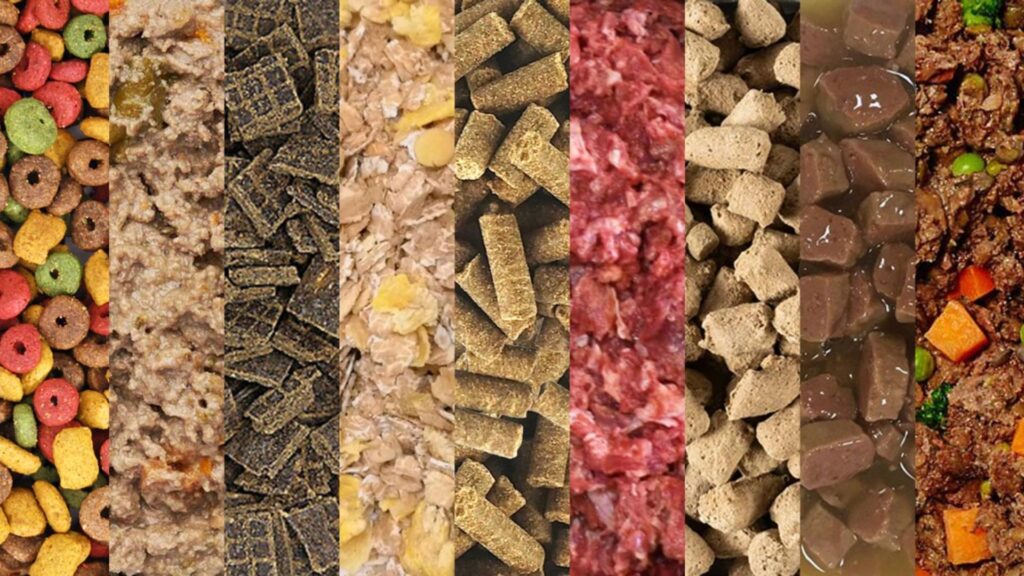
Portuguese Water Dogs do well on various types of diets, but each has its pros and cons:
- Dry Kibble: Convenient and cost-effective, high-quality dry food can provide balanced nutrition for your dog. However, not all kibbles are created equal, so it’s important to choose a brand that uses wholesome ingredients without fillers or artificial additives.
- Wet Food: Often more palatable to dogs and easier to chew, wet food can be a good option for picky eaters or older dogs with dental issues. However, it can be more expensive and less convenient than kibble.
- Raw Diets: Some owners choose to feed their Portuguese Water Dogs a raw diet, believing it more closely mimics what dogs would eat in the wild. While it can offer fresh, whole-food ingredients, it’s essential to consult with a vet to ensure nutritional balance and to be aware of the risks of bacterial contamination.
- Homemade Meals: Cooking for your dog allows you to control the ingredients and avoid preservatives and additives. However, it requires careful planning to ensure it meets all of your dog’s nutritional needs and can be time-consuming.
Each food type comes with its set of considerations, from cost and convenience to nutritional balance and safety. Ultimately, the best choice depends on your dog’s health, preferences, and your lifestyle.
Feeding Schedule: How Often to Feed Your Portuguese Water Dog
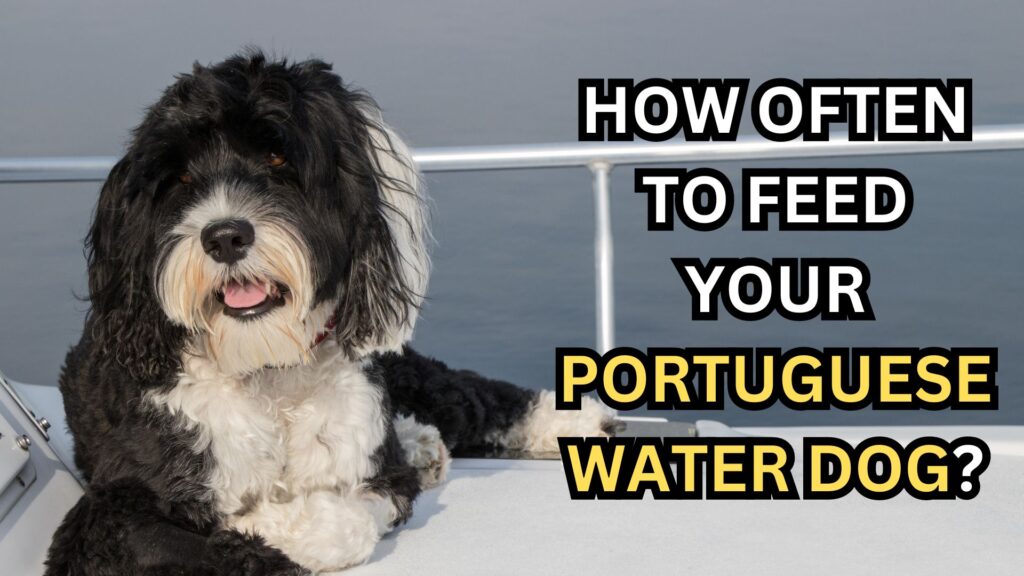
Establishing a consistent feeding schedule for your Portuguese Water Dog offers numerous benefits, not least of which is preventing overeating and obesity. A regular feeding routine helps regulate your dog’s digestive system and can significantly contribute to maintaining a healthy weight.
For puppies, feeding should be spread throughout the day—three to four meals until they are six months old. This frequent feeding supports their high energy levels and aids in their growth and development.
Once your dog reaches adulthood, transitioning to two meals a day is recommended. This change aligns with their slower metabolism and helps reduce the risk of weight gain.
Senior dogs, depending on their health status and vet recommendations, may continue with two smaller meals or adjust to a diet that suits their specific nutritional needs and activity levels.
Special Dietary Considerations and Health Concerns
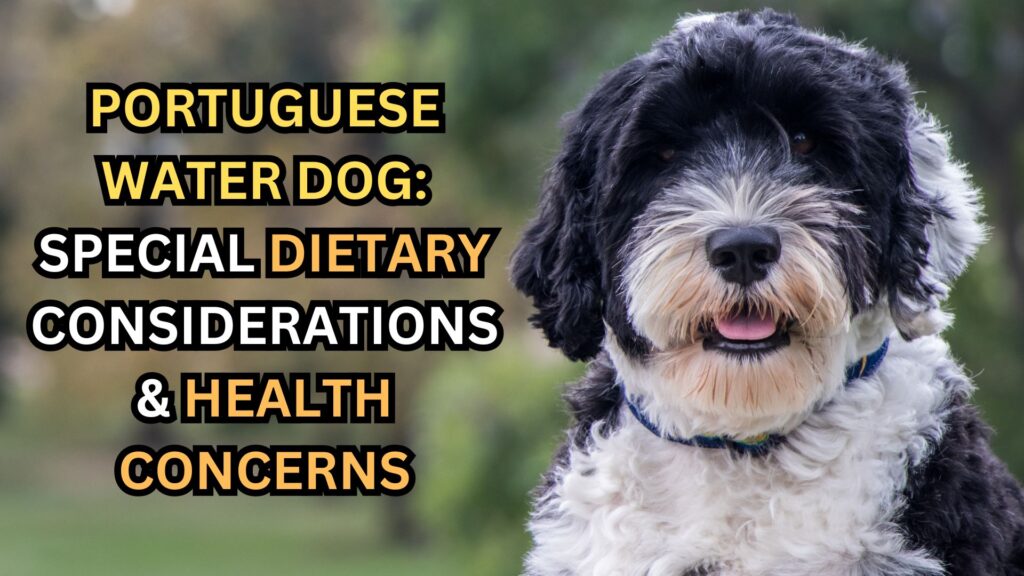
Portuguese Water Dogs, like all breeds, may face certain health challenges that can be managed or mitigated with a proper diet. Conditions such as hip dysplasia and allergies are prevalent within the breed.
A diet rich in omega-3 fatty acids, found in fish and flaxseed oil, can support joint health and reduce inflammation. For dogs with allergies, identifying and eliminating the offending allergens from the diet is crucial.
Often, this means choosing dog foods with novel protein sources (like duck or venison) and limited ingredients to minimize the risk of allergic reactions.
For those with sensitive stomachs or other dietary restrictions, selecting a dog food that is easily digestible and free from common irritants (like corn, soy, and wheat) is essential.
Probiotics and prebiotics can also be beneficial, supporting a healthy gut flora and improving digestive health.
Reading Dog Food Labels: What to Look For
Understanding dog food labels is critical in choosing the best food for your Portuguese Water Dog. The ingredient list is a good starting point, with items listed by weight. Look for whole, recognizable ingredients, with a specific meat or meat meal as the first ingredient, indicating a high-quality protein source.
Nutritional facts and certifications can also provide insight into the food’s quality. The Association of American Feed Control Officials (AAFCO) provides guidelines for pet foods, and products meeting these standards will often state this on the label.
Additionally, be wary of artificial colors, flavors, and preservatives like BHA, BHT, and ethoxyquin, as these can be harmful to your dog’s health.
Supplements: Are They Necessary?
While a well-balanced diet should provide most of the nutrients your Portuguese Water Dog needs, there are circumstances where supplements can be beneficial.
For example, dogs with joint issues may benefit from glucosamine and chondroitin supplements to support joint health. Omega-3 fatty acids from fish oil can promote a healthy coat and skin, and also support cardiovascular health.
However, it’s important to consult with your veterinarian before adding any supplements to your dog’s diet. They can offer guidance on what supplements, if any, would be beneficial for your dog’s specific health concerns and dietary needs.
By paying close attention to your Portuguese Water Dog’s dietary needs, reading labels carefully, and possibly integrating supplements as needed, you can help ensure your dog leads a healthy and happy life.
Remember, each dog is unique, and what works for one may not work for another. Regular check-ups with your vet will help you adjust as your dog’s needs change over time.
How to Transition Your Portuguese Water Dog to a New Diet
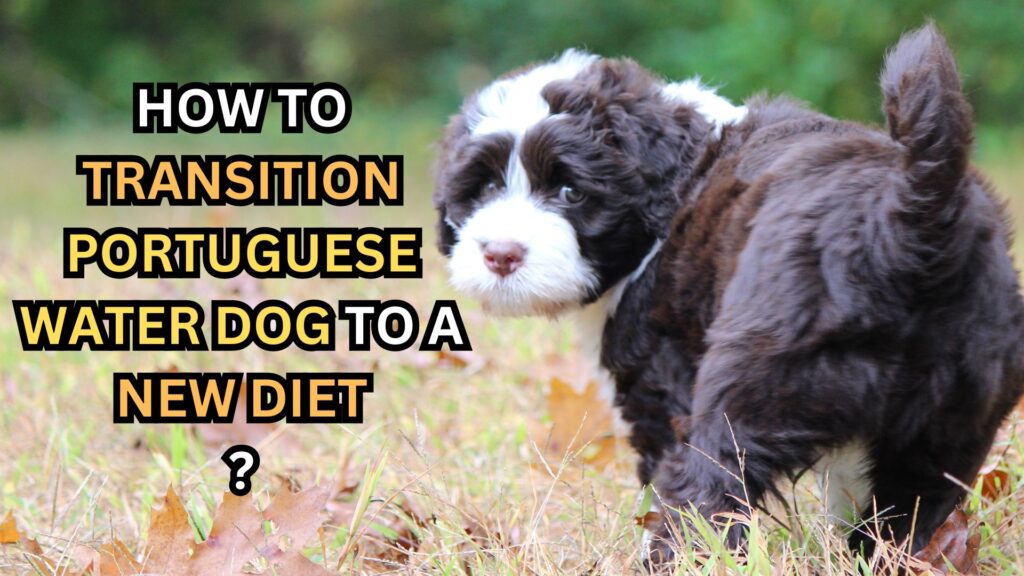
Transitioning your Portuguese Water Dog to a new diet should be done with care to avoid gastrointestinal upset. The key is gradual change.
Start by mixing approximately 25% of the new food with 75% of the current food and gradually adjust the proportions over the course of a week or two until you have completely switched to the new food. This slow transition allows your dog’s digestive system to adjust without causing distress.
Monitoring your dog’s reaction to the new diet is crucial. Look out for signs of gastrointestinal discomfort, such as vomiting, diarrhea, or decreased appetite, as well as positive changes in their energy levels and coat condition. If adverse reactions occur, consult with your veterinarian for guidance.
FAQs
How often should I adjust my Portuguese Water Dog’s diet?
Adjustments to your dog’s diet should be made based on changes in age, health, and activity level. Puppies to adults, adults to seniors, or changes due to health conditions are all reasons for a dietary adjustment. Regular veterinary check-ups will help you decide when an adjustment is necessary.
Can Portuguese Water Dogs eat human foods? If yes, which are safe?
Yes, Portuguese Water Dogs can eat some human foods in moderation as treats or supplements to their diet. Safe options include cooked lean meats, some fruits like apples (without seeds) and blueberries, and vegetables like carrots and green beans.
Always avoid toxic foods like chocolate, grapes, onions, and foods containing xylitol.
What should I do if my dog is gaining too much weight or not enough?
For weight gain, reassess the portion sizes, reduce treats, and increase physical activity. For weight loss, ensure you’re not underfeeding and consider the nutritional value of the current diet. Consulting with a vet can provide tailored advice for diet adjustment and health evaluation.
How can I tell if my Portuguese Water Dog is allergic to certain foods?
Signs of food allergies in dogs include itching, excessive grooming, skin rashes, and gastrointestinal issues. If you suspect a food allergy, consult with a veterinarian. They may recommend an elimination diet to identify the allergen.


